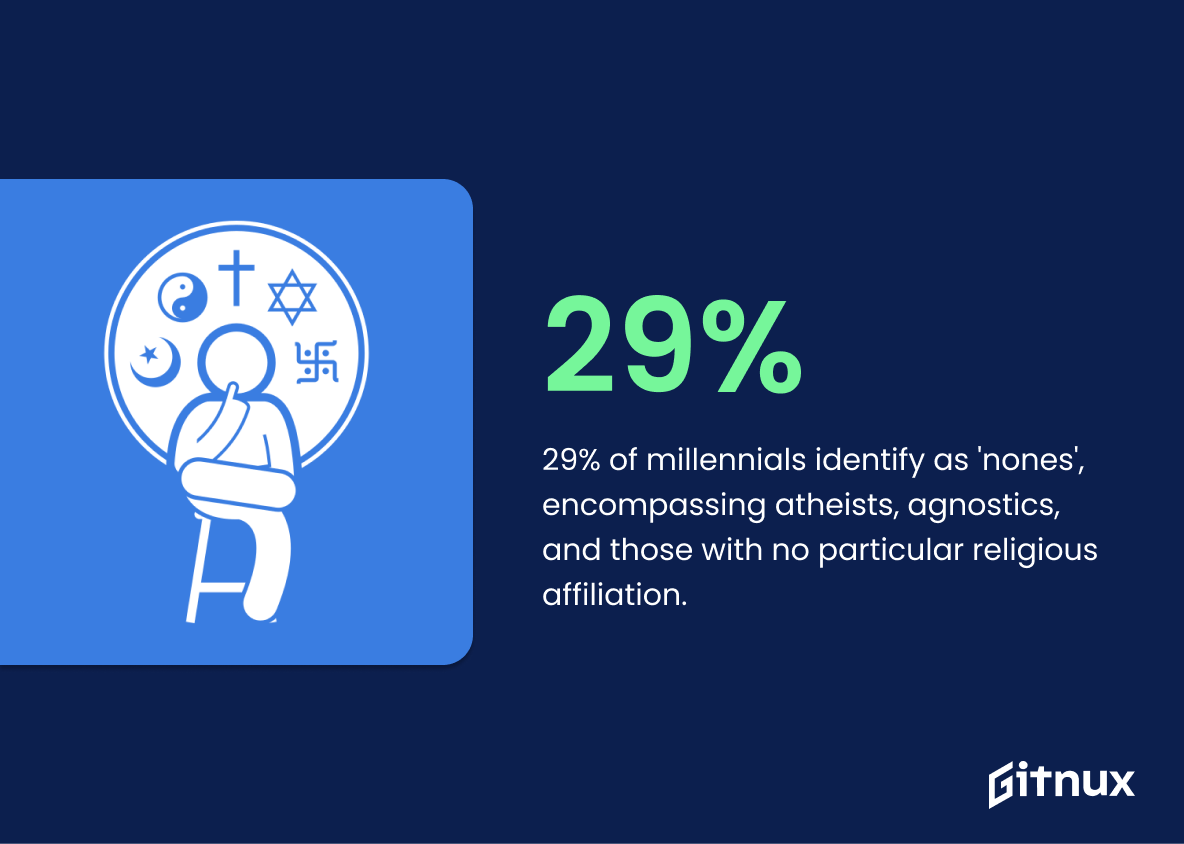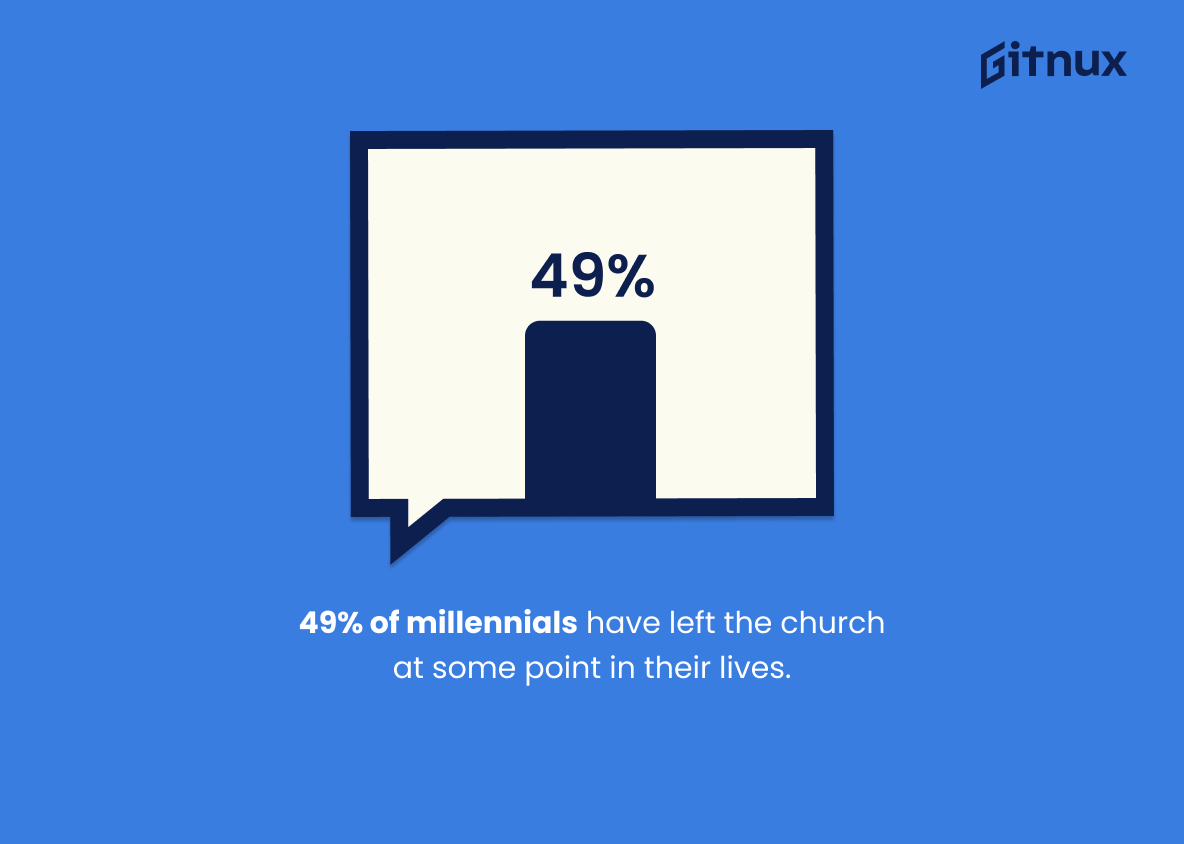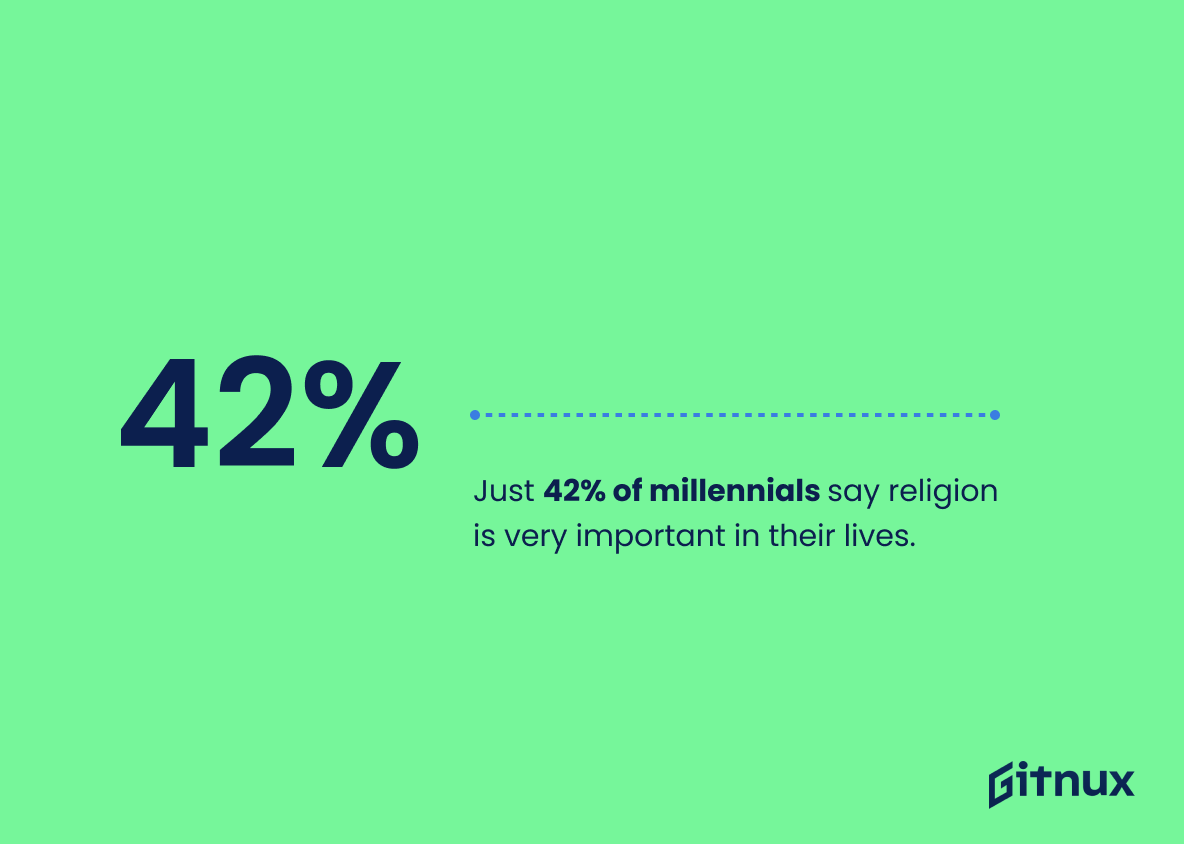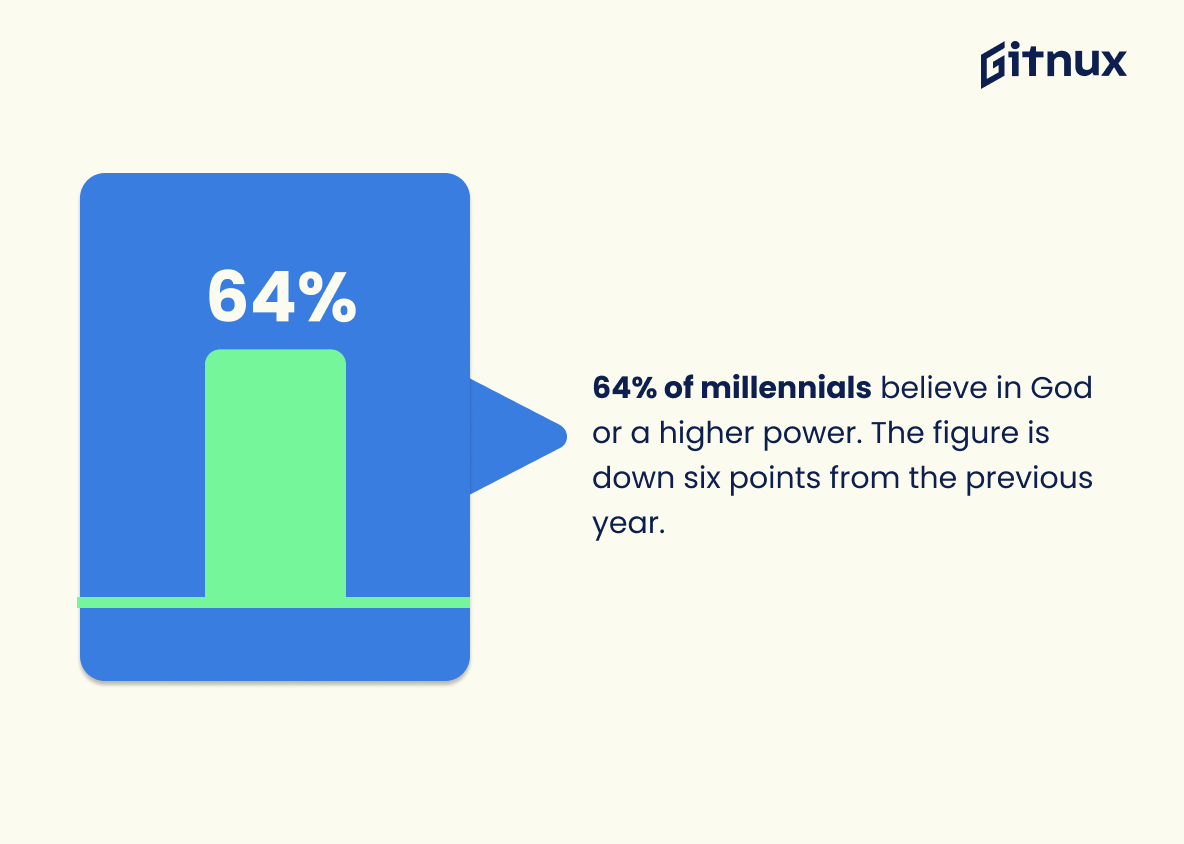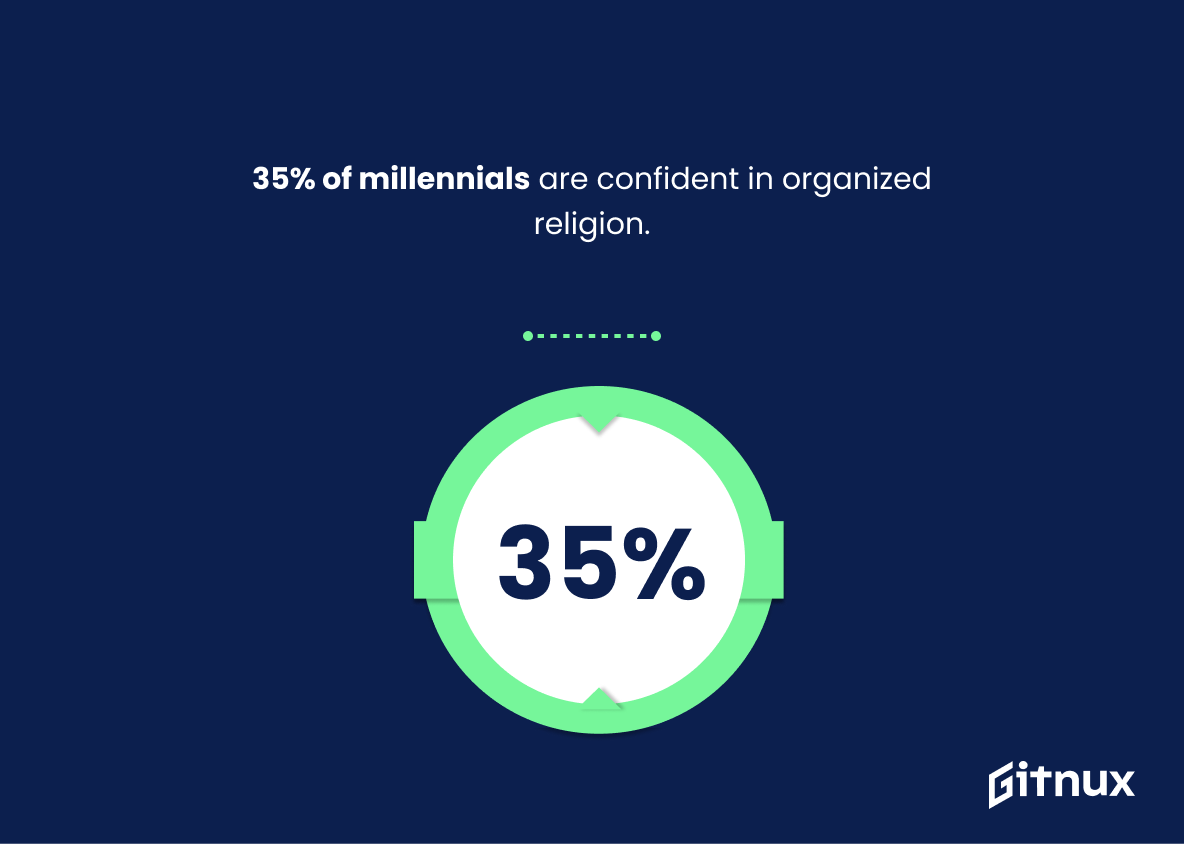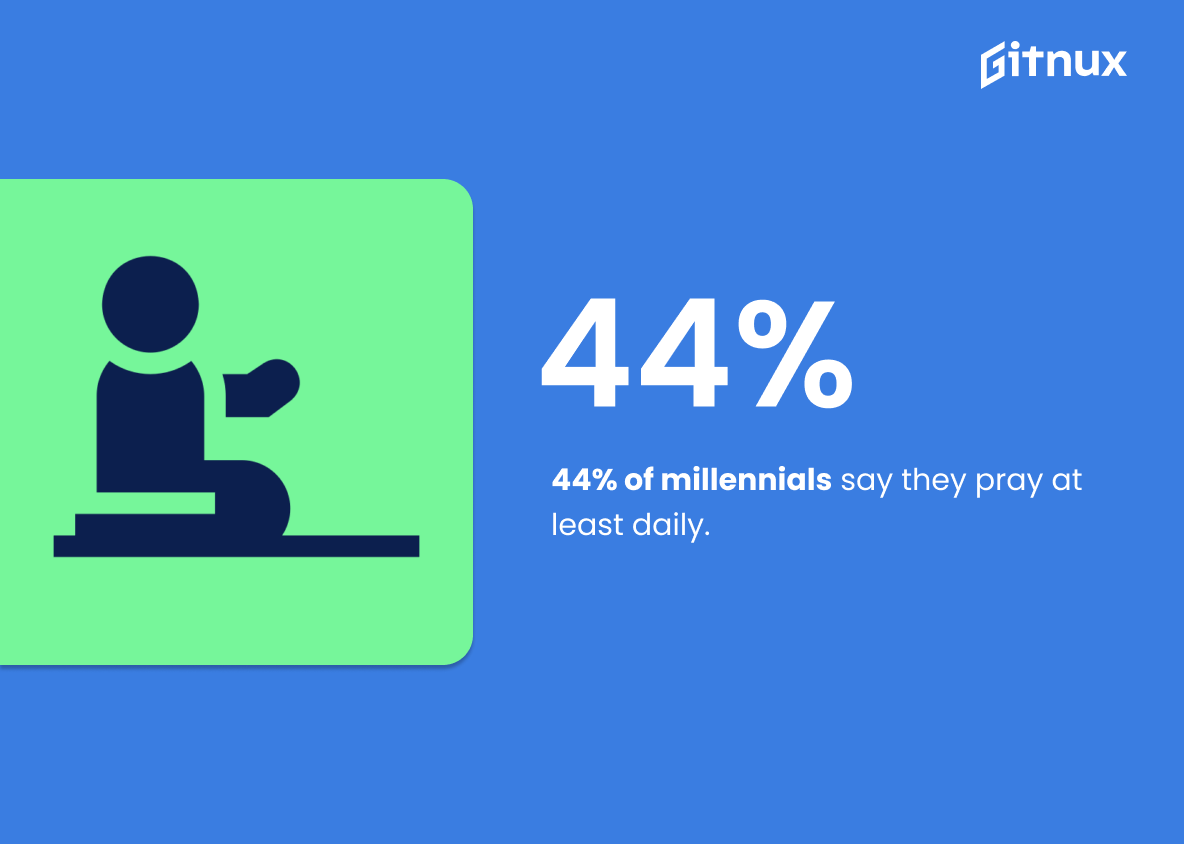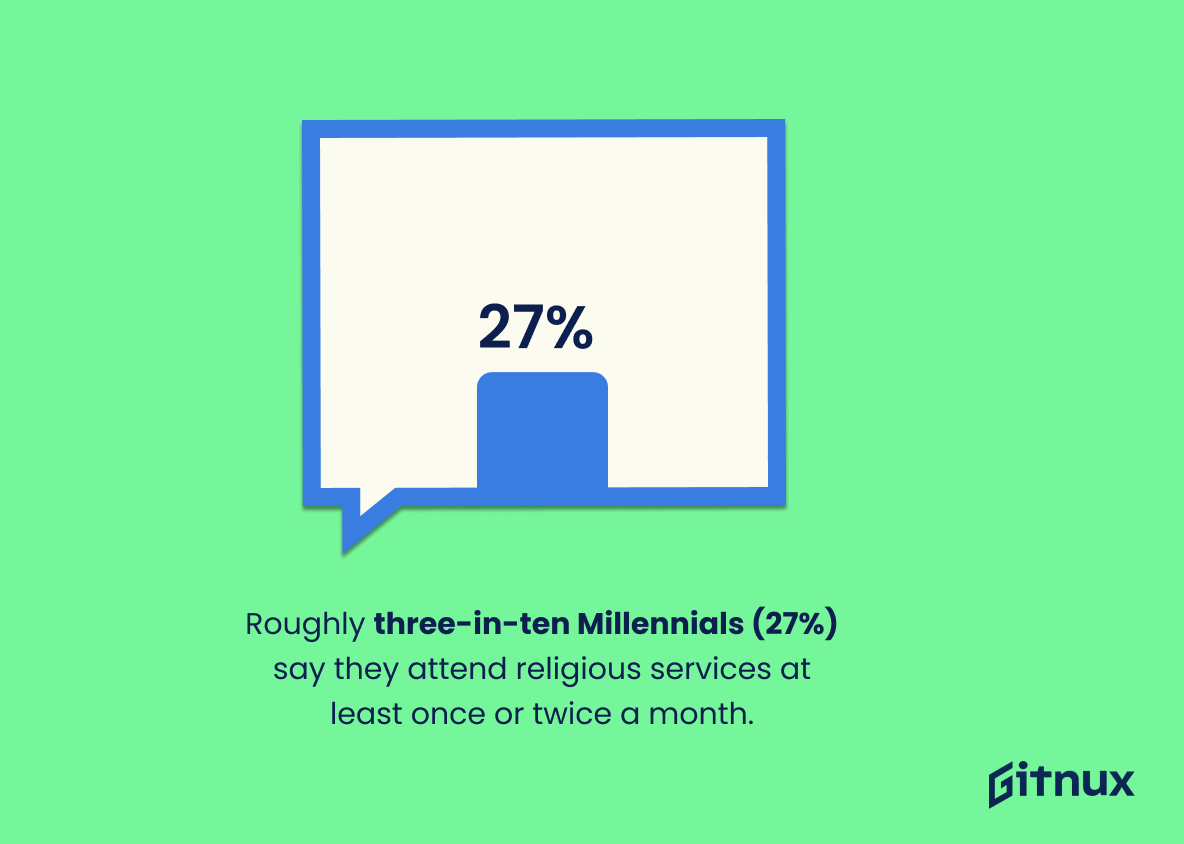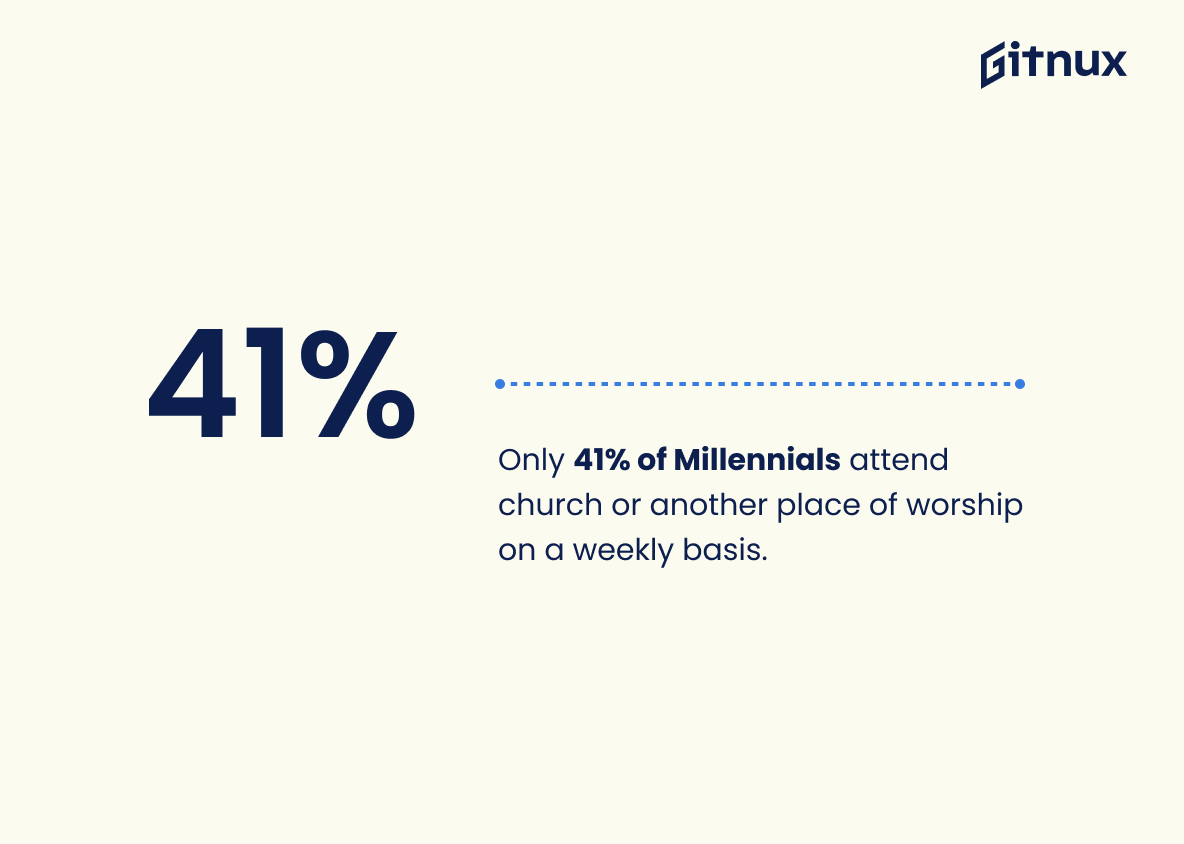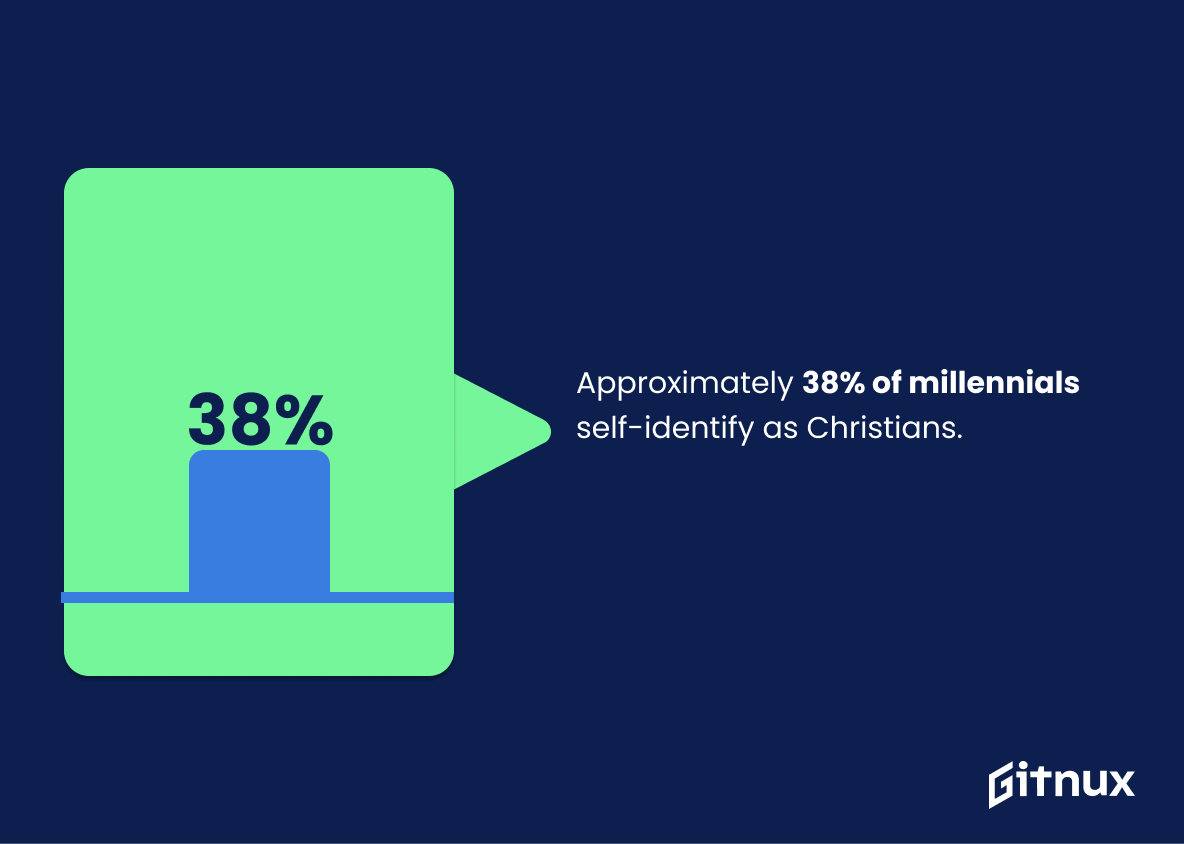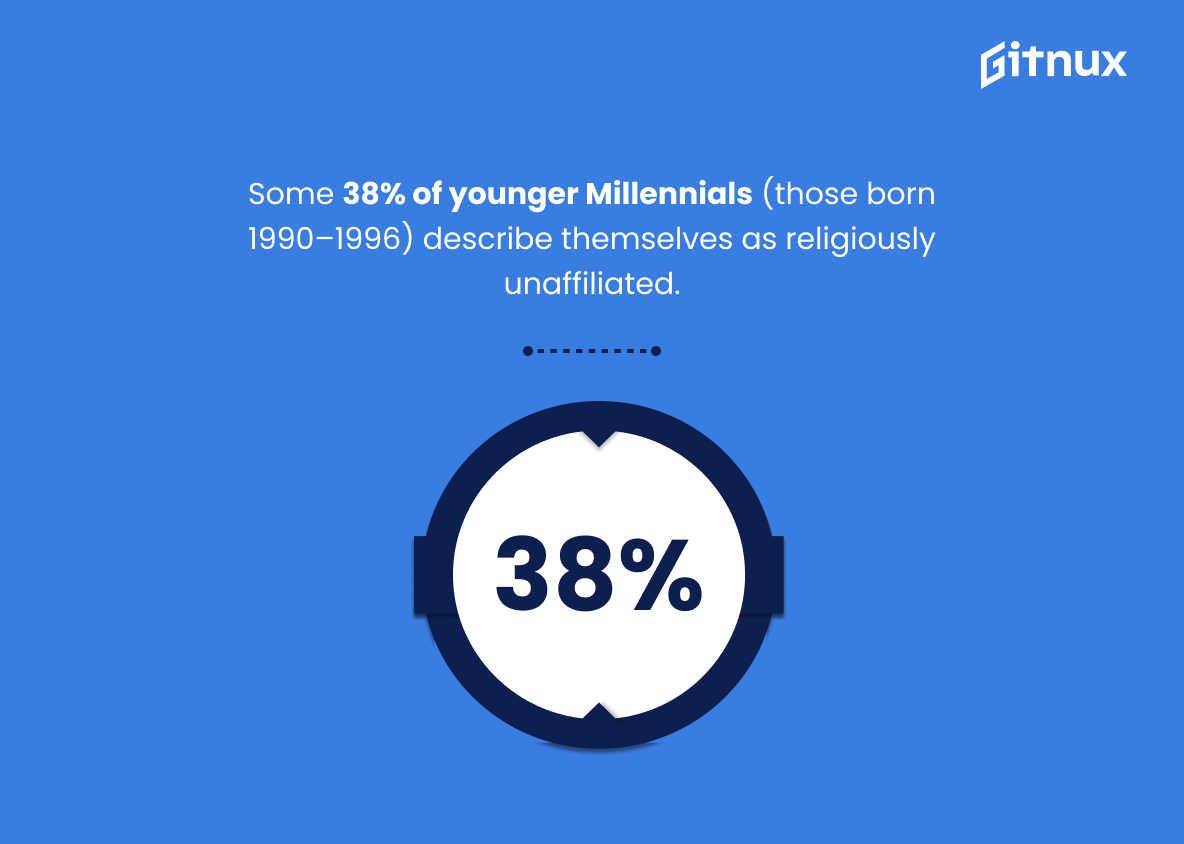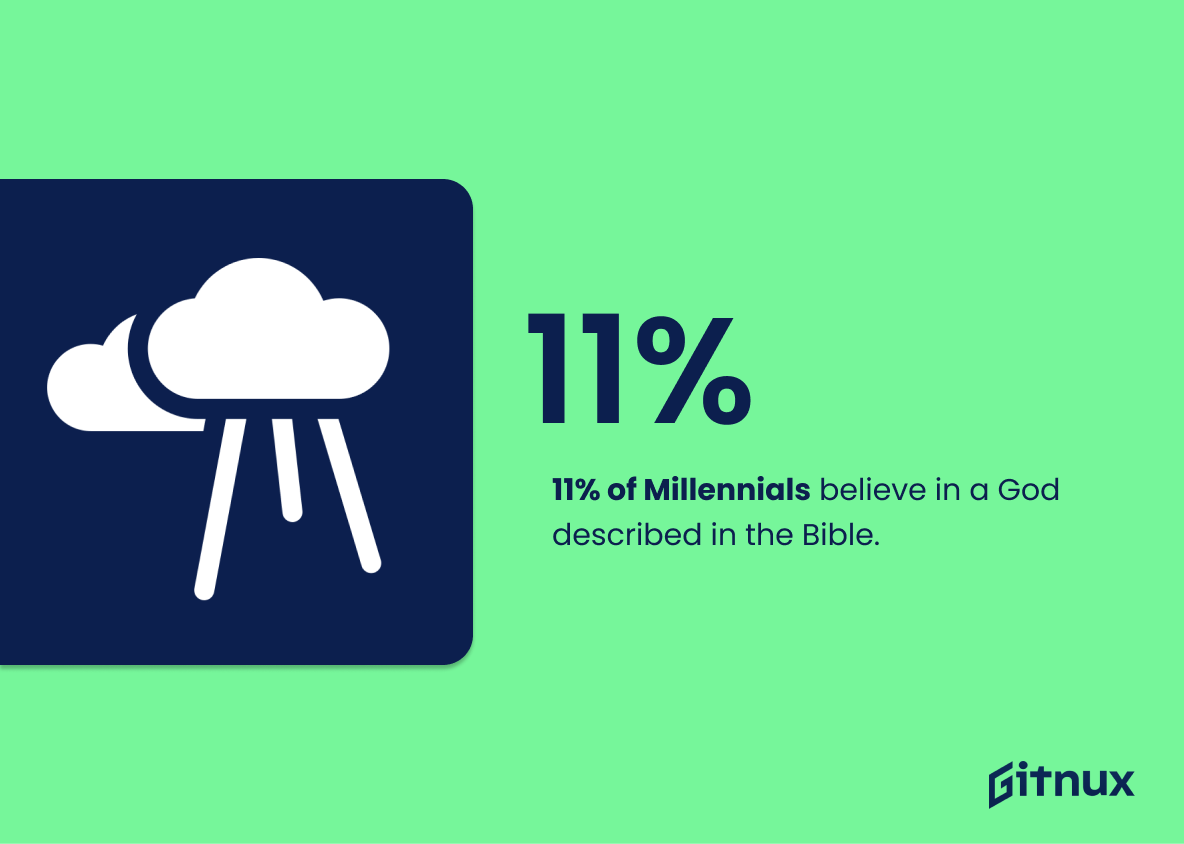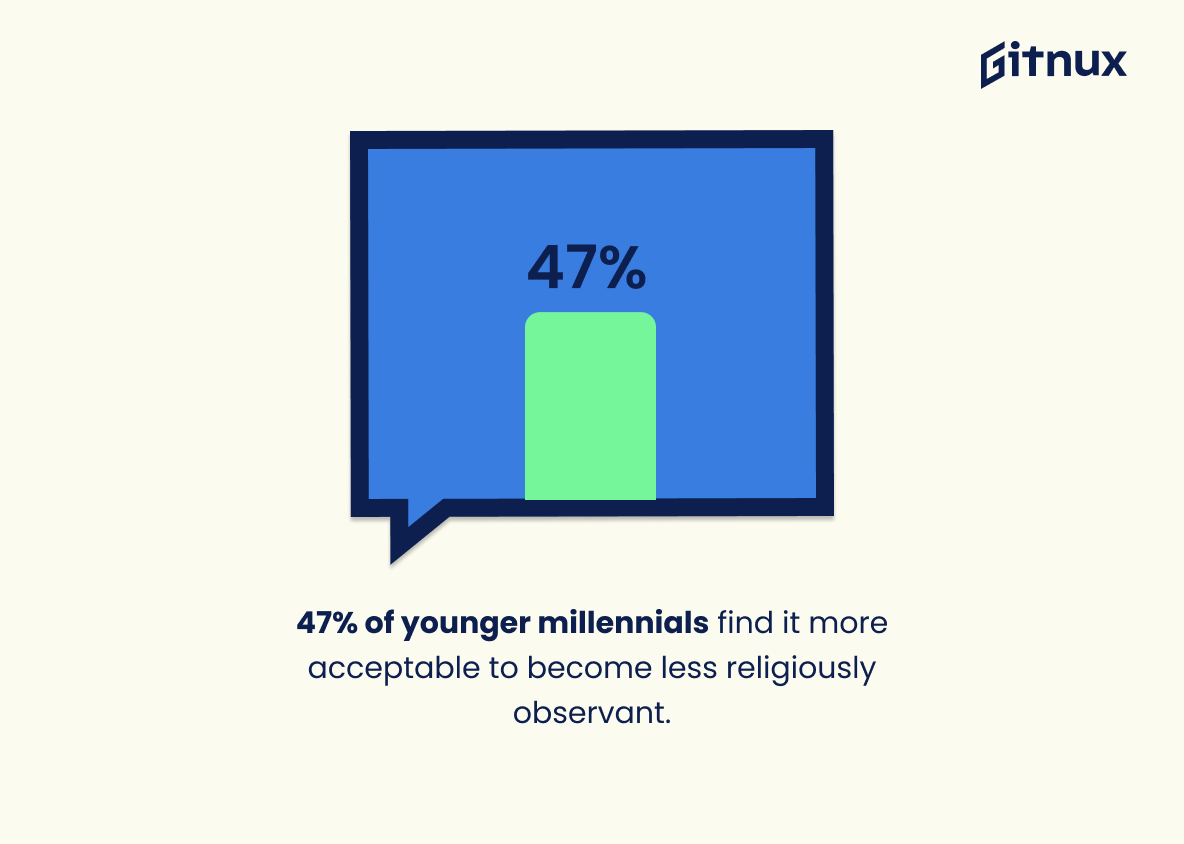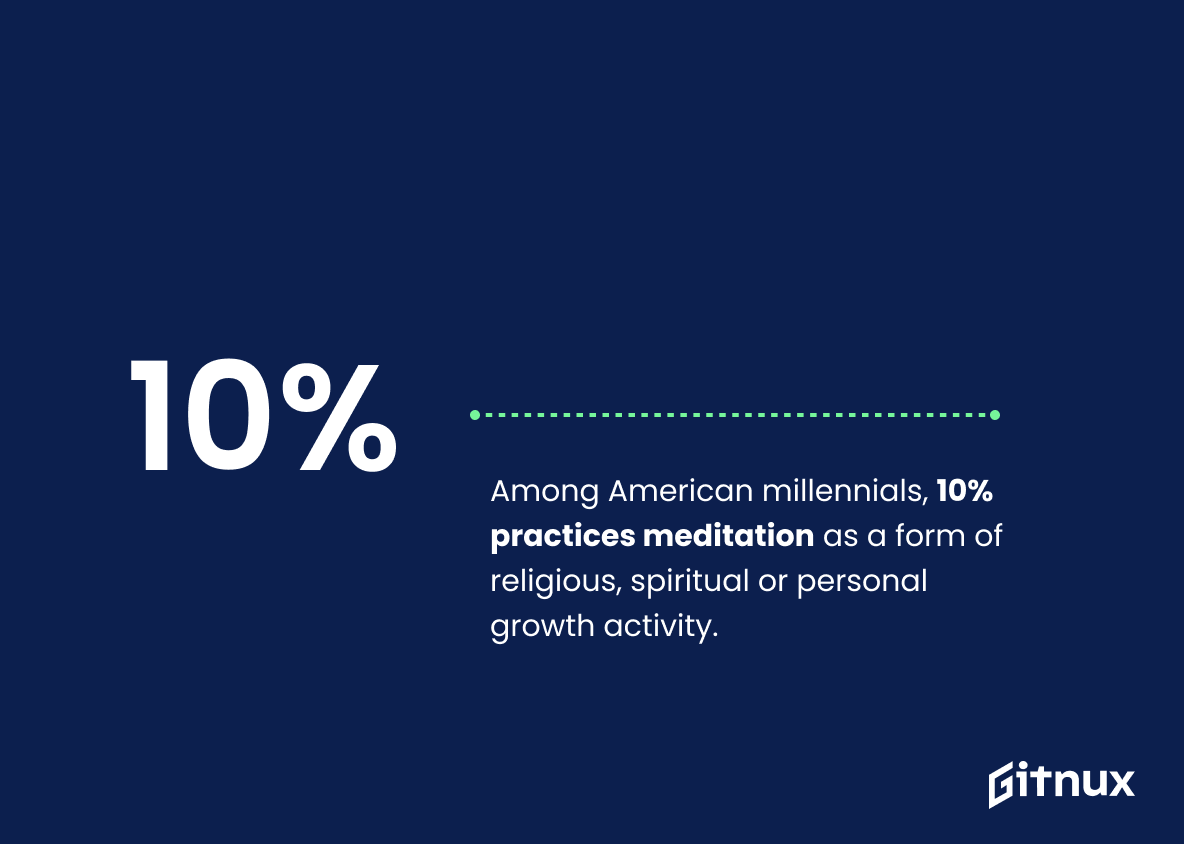In a dynamic and rapidly evolving world, understanding generational attitudes towards religion is more important than ever. This blog post aims to delve deep into the intriguing realm of religion as it is perceived by Millennials, arguably the most influential generation of our times. We will explore a wealth of statistical data, revealing marvellous insights about their faith, belief systems, and the ways they practice or abstain from religion. Join us on this enlightening journey as we analyse a tapestry of Millennials and Religion Statistics, unlocking patterns and trends that could shape not only the spiritual landscape but also socio-cultural dynamics in the coming years.
The Latest Millennials And Religion Statistics Unveiled
Among millennials, 29% say they are “nones” — an umbrella term that includes atheists, agnostics and those who describe their religion as “nothing in particular.”,
This striking figure of 29% indicates a distinct departure for millennials from traditional faith adherence, shedding light on an emerging trend of religious disaffiliation or spiritual fluidity. This statistic serves as a compelling compass, guiding the discourse in the blog post to highlight not only the changing relationship between millennials and organized religion, but also the evolving landscape of belief systems in contemporary times. It underscores the need for inquiry, dialogue, and deeper understanding of this generational shift for religious institutions, sociologists, and even policy makers.
49% of millennials have left the church at some point in their lives,
Unraveling the statement, an eye-opening revelation emerges that nearly half, precisely 49%, of millennials have at one point in time, found themselves drifting away from the sanctuary. This figure isn’t trivial, it’s a census call that echoes a dramatic shift in the religious affiliation landscape among the younger generation.
In a discussion about millennials and religion, this statistic is akin to the pulsating heartbeat, providing not only the rhythm but the central narrative. It signifies a generational deviation from established norms and religious traditions, spotlighting an evolution in the faith, ethos, and spirituality equations of the modern world. This statistic, therefore, coaxes us to prod deeper and examine the nuances and undercurrents that led to this religious maelstrom. It’s a catalyst for a vibrant discourse on the complex interplay between millennials and religion, the causative factors and the broad implications thereof, on our societal and individual spirituality contour.
Just 42% of millennials say religion is very important in their lives,
Delving into the heart of millennials’ faith and spirituality, it is striking to observe that a mere 42% attribute significant importance to religion in their lives. This figure is a revelation, shedding light on the shifting spiritual landscape among this age group, compared to previous generations. In a world increasingly shaped by technology and critical thinking, the statistic suggests that traditional forms of faith and worship might be less appealing to millennials. It could also hint towards a rise in secularism, agnosticism, or alternative spiritual practices. Analyzing this value goes beyond mere percentages—it offers a pulse check on societal shifts, and prompts discussions about the evolving role of religion in contemporary youth culture. So, in our blog post that brings to the forefront millennials and religion, this statistic is a touchstone, a point of departure from which we dig deeper into the attitudes, values, and beliefs of the millennial generation.
64% of millennials believe in God or a higher power. The figure is down six points from the previous year,
In the evolving mosaic of millennial beliefs, the 64% of millennials who believe in God or a higher power indicates a notable shift in spiritual paradigms. A waning of six percentage points from the previous year. This finding isn’t just a stray data point – it’s a ripple effect in the monolithic religious landscape, potentially revealing a detour towards more personal spirituality or secularism among Millennials. Hence, it throws considerable light on their attitudes towards traditional faith-based systems, broadening our understanding of Millennial attitudes towards religion.
35% of millennials are confident in organized religion,
In a digital era of rising secularism, one might be intrigued by the reality that over one-third of millennials still express a sense of confidence in organized religion. This compelling statistic forms an essential cornerstone of our exploration on ‘Millennials and Religion Statistics,’ offering insight into the juxtaposition of the millennial generation’s faith-based convictions despite the broader societal shift towards secularism. This key figure highlights a reservoir of faith that persists even amidst the fluctuating religious landscapes, thereby shedding light on the complex intersection of millennial attitudes, sociocultural transitions, and religious dynamics. It serves as a vital cog in the prism through which we understand this generation’s spiritual dimensions, adding depth, and nuance to our discourse.
44% of millennials say they pray at least daily,
Shedding light on the fact that ‘44% of millennials claim a daily prayer habit’ gives us a vital piece to the puzzle when trying to comprehend the religious spectrum of millennials. This number lends substance to the argument that, contrary perhaps to popular beliefs, millennials do not completely shy away from religious practices. While their way of engaging with faith might not follow traditional lines, we see here that a significant portion of this age group integrates some form of spiritual habit in their daily lives. This figure, therefore, becomes an important pivot point in exploring how millennials relate to religion, their commitment to personal spirituality, and how these factors subsequently shape societal and cultural models.
Roughly three-in-ten Millennials (27%) say they attend religious services at least once or twice a month,
Peering through the lens of Millennial behavior towards religion, it’s fascinating to note that nearly 27% confess to attending religious gatherings once or twice a month. This significant fraction adds a nuanced layer to the complex portrait of Millennial spirituality, stirring a meaningful dialogue about their faith engagement. It confronts assumptions about Millennials’ detachment from traditional religious practices and provides a broader perspective into their diversity of religious participation. Observing, therefore, this numerical snapshot is not only essential for understanding their religious leanings but also provides insights into shaping spiritual narratives or church strategies that cater to the Millennial generation. Hence, it’s an intriguing piece of the larger puzzle of Millennials and Religion Statistics, contributing to a holistic comprehension of this demographic’s religious life.
Only 41% of Millennials attend church or another place of worship on a weekly basis,
Diving into the heart of the matter, the statistic of “Only 41% of Millennials attending church or other places of worship weekly”, serves as a compelling pulse-check on the religious landscape among this generation. It’s an illustrative reflection of the evolving relationship between Millennials and religious practices, which in turn, affects the overall societal dynamics. In the framework of a blog on Millennials and Religion Statistics, this raises intriguing questions and discussions about the changing shape of faith in the modern world, individual beliefs among Millennials, and how religious institutions might need to reimagine their methods to better connect with this generation.
Approximately 38% of millennials self-identify as Christians,
In navigating the religious landscape of millennials through our blog post, the statistic’ Approximately 38% of millennials self-identify as Christians,’ serves as a compass to understand the prevailing religious trend within this demographic. It’s a revealing snapshot into the faith-based identification amongst millennials, highlighting that almost four out of every ten adhere to Christian beliefs. This figure both provides a valuable baseline for comparison with other faith groups and serves as a springboard for deeper exploration – whether that’s uncovering the factors influencing this percentage, tracing changes over time, or drawing contrasts with other generations. Essentially, it brings into focus the fluctuating dynamic between millennials and organized religion.
Some 38% of younger Millennials (those born 1990–1996) describe themselves as religiously unaffiliated,
In the vast landscape of Millennials and Religion Statistics, this particular finding- a startling 38% of younger Millennials (those born 1990–1996) identifying as religiously unaffiliated – stands as a potent beacon. It showcases an undeniable tilt towards a more secular mindset in this generation. This shift towards religious disengagement embodies a new narrative within the realm of spirituality and religion for Millennials. The implication of this statistic is not just about an individual’s personal religious beliefs but serves as an indicator of wider societal trends, influencing areas such as community engagement, political stances and value systems. This statistic acts as both a barometer and a compass – measuring where we currently stand and potentially guiding the trajectory of future religious, social and political evolutions.
11% of Millennials believe in a God described in the Bible,
Delving into this intriguing statistic, which articulates that a sparse 11% of millennials hold faith in a God defined in the Bible, sheds light on the rapidly evolving landscape of religious beliefs within this generation. It brings forward an era of transformative perspectives, characterized by more eclectic, personalized spiritual paths that reveal shifting priorities among millennials. More than a stark number, this statistic serves as a counterpoint to traditional religious beliefs, unfurling the noteworthy trend of an increasing shift towards secularism or spiritual exploration beyond established doctrines among the newer generations. Thus, it is a cornerstone revelation in the narrative of millennials and religion, underpinning the post and catalyzing a profound conversation about faith, belief systems, and how they are being reconstructed in our contemporary society.
47% of younger millennials (those born between 1990 and 1996) say it is more acceptable to become less observant religiously,
Casting a spotlight on this statistic that 47% of younger millennials, born between 1990 and 1996, view religious observance with less strictness can unravel fascinating perspectives in the realm of millennials and religion. By etching it within the context of the blog, it showcases a noticeable shift in traditional religious landscapes and attests to the complex negotiation between modernity and faith among this demographic. It serve as a significant marker of change, fostering insights into the secularizing trend and offering a unique window to comprehend their evolving values and belief systems. Furthermore, it aids in sculpting future conversations around religious practice, societal trends and generational differences.
Among American millennials, 10% practices meditation as a form of religious, spiritual or personal growth activity,
In a quest to unravel the mosaic of the unique relationship between millennials and religion, this statistic, presenting 10% of American millennials practicing meditation, provides a novel hue. It underscores an intriguing trend of personal wellness and spiritual exploration prevalent among Millennials, signifying a demographic shift from traditional religious practices to more individualized spiritual pursuits. This finding resonates with the broader narrative of Millennials carving their own spiritual path, often independent of established religious institutions. Therefore, integrating it into a blog post would give readers an enriched understanding of how millennials seek religious meaning, spiritual fulfillment, and personal growth, thereby painting a more comprehensive picture of the millennial religious landscape.
Conclusion
In essence, Millennials and religion statistics shed light on how younger generations are navigating faith and spirituality in an increasingly secular world. While traditional religious practices seem to be less adhered to by this generation, the quest for personal and spiritual growth remains strong. The inclination towards personal spirituality and non-institutional religious practices indicates a significant shift in how faith is perceived and practiced. As society continues to evolve, it is crucial to keep abreast of these changing attitudes and behaviors. Understanding these shifts will not only foster more inclusive and relevant faith communities but also aid in constructing bridges of understanding between different generations and belief systems.
References
0. – https://www.www.prri.org
1. – https://www.barna.com
2. – https://www.news.gallup.com
3. – https://www.www.pewresearch.org
4. – https://www.www.pewforum.org
5. – https://www.www.barna.com
